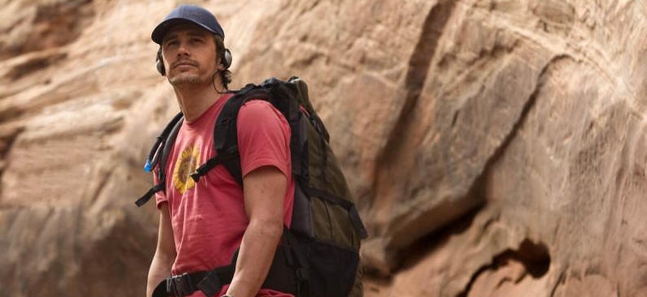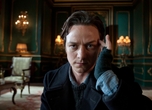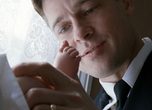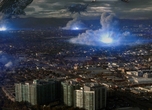127 Hours
The true-life tale of a trapped climber is an exercise in total cinema

(C) 2010 TWENTIETH CENTURY FOX
Posted: Tue Jun 21 2011
Director: Danny Boyle
Starring: James Franco, Lizzy Caplan, Amber Tamblyn
Time Out rating: 
Danny Boyle is good at taking a grimy subject, flashing it a smile and stabbing it through the heart with a big, fat, dripping shot of adrenalin. For Trainspotting, he countered the lethargy of heroin with energetic chases through the streets of Edinburgh and the beats of Underworld on the soundtrack. For Slumdog Millionaire, he batted away all sorts of deprivation in favour of a final-scene Bollywood dance number in a Mumbai train station. When he's not having fun with genres (28 Days Later, Sunshine), he has a knack for telling tales from the real world – but doing so from countless strange angles and with endless hurried flights of fancy and imagination. Nothing and no one stays still for long in a Boyle film.
There's little more gruesome and extreme than the story of Aron Ralston, an American outdoors nut who in 2003 went canyoning alone in Utah without telling anyone where he was going. James Franco plays the frenetic 27 year old as an experience junkie and sociable loner. He bombs through the desert on a mountain bike leaving a trail of dust behind him. He meets girls in the wilderness, makes them laugh and leaps into underground lakes with them before saying goodbye. He bounds over gulleys. Then he misses his footing, slips into a canyon and a boulder follows him down, pinning his arm to the wall just as he lands on his feet. He's trapped, and the film's kineticism turns in on itself: like Ralston, its energy is stuck in a hole.
From the off, Boyle winds up our nerves with split-screens, pumping music and archive inserts – and he never stops. We know, of course, that Ralston eventually escapes by carving off his arm with a penknife, so there's a deep intake of breath when the accident happens early. Where will Boyle take us? It's a great challenge to witness and it brings out the best in Boyle. Just don't expect to breathe normally for some time.
Boyle focuses intensely on Ralston's thoughts, both rational and delusional as the days pass. He tries pulleys. He tries scratching away at rock. He tries everything. Franco's performance is a brilliant show of constrained muscularity. We see flashbacks of his relationships and realise that he has some ways to mend if he ever gets out alive. We're stuck with Ralston, and we're privy to his mind because he keeps record with a camcorder in his rucksack. On top of that, Boyle uses every angle available to him, and AR Rahman's score helps to capture and stress Ralston's mental fragility.
The scene which all viewers will expect and dread in equal measure – the cutting of the arm – is horrific and smartly done. Boyle doesn't sidestep the truth: we see Ralston picking through nerves as Rahman's music records the most nightmarish of internal body screeches. But neither does Boyle draw it out unnecessarily. We share Ralston's shock and wonder as he looks back at his bloody severed arm stuck behind the rock and, like him, wonder how it ever came to this.
127 Hours is a tough ride: not only because of the grim facts but because of the overwhelming experience of total cinema that Boyle inflicts on us to tell Ralston's story. At the end, we stagger like Ralston from the dark into the light. We might have both our arms left, but our nerves are just as terrorised.
127 Hours is out now
Tweets
- About Us |
- Work for Time Out |
- Send us info |
- Advertising |
- Mobile edition |
- Terms & Conditions |
- Privacy policy |
- Contact Us
Copyright © 2014 Time Out Tokyo














Add your comment